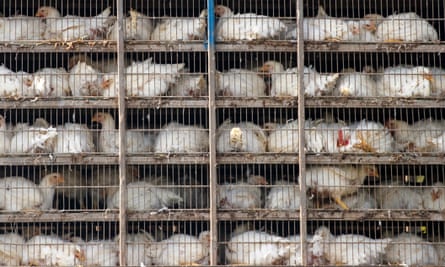Pork and poultry with “unacceptable” levels of salmonella and E coli are reaching supermarket shelves in the US, according to the preliminary findings of a study that may confirm the fears of campaigners currently fighting to ensure the UK’s agriculture bill will protect domestic food standards and consumers.
The agriculture bill 2019-21 will return to the House of Commons on Monday, and will include an amendment from the House of Lords calling for all food imports to be produced to domestic standards.
Campaigners fear that a failure to protect UK food standards in law means that a future trade deal with the US might allow more cheaply produced meat to flood the UK market.
Downing Street has repeatedly refused to agree to any parliamentary restrictions or so-called “red lines” on its negotiating position in US trade talks. Trade secretary Liz Truss has argued that parliament would be able to block a trade deal if a majority of MPs wanted a vote on it, but only after the deal had been already been negotiated and signed.
Campaigners may feel their arguments are bolstered by the preliminary findings of a five year study being carried out at George Washington University by Prof Lance Price, which tested meat from US shops and found that about 14% of the poultry samples and 13% of the pork had traces of salmonella.
Testing also revealed that more than 60% of the pork products had E coli on them, as did around 70% of the beef products, 80% of the chicken products, and more than 90% of the turkey products. Price shared his findings with the team researching a Channel 4 Dispatches investigation into American meat, which is due to air on Monday night, and commented: “It’s an unacceptable rate given that it is controllable, but the industry has been very successful in fighting any kind of regulations there.”
Meanwhile a review of the impacts of Covid-19 on US livestock published last month looked at USDA data and found that in the months since several poultry plants were given government permission to increase the speeds of their production lines, the amount of chicken meat being condemned and discarded owing to suspected contamination fell 10% from the same period in 2019.
Dr Laura Boyle, senior research officer at the Teagasc Animal and Grassland Research Centre in Ireland and one of the authors of the review, said she believed the food safety implications were pretty dramatic.
A spokesperson for the Food Safety Inspection Service (FSIS) – an arm of the US agriculture department that oversees the meat industry – attributed low condemnation numbers to an agency rule that requires some plants to pre-sort and discard birds before federal inspection.

FSIS robustly defended the safety record of US meat. “FSIS employs more than 7,500 inspectors to ensure safe and wholesome products. In order to conduct the additional required offline food safety tasks, which have proven to have a greater impact on food safety, FSIS is increasing the number of higher-graded inspector positions in establishments that have converted to the modernised inspections system.”
A spokesperson for the US National Chicken Council told the Guardian: “The US chicken industry works to eradicate all strains and products undergo microbiological testing to look for their presence. If you were to look at the US Department of Agriculture’s most recent posting of categories for large broiler establishments, you would see that more than 93% of the industry is meeting the FSIS performance standard for salmonella on whole broiler carcasses. Similarly, 95% of large broiler establishments are meeting the FSIS performance standard for salmonella on chicken parts.”
He added that modernised plants with increased line speeds have been operating for over two decades and have food safety records that are as good or better than traditional plants.
National Farmers’ Union president Minette Batters said: “A successful farming future rests on how the government shapes trade deals with countries around the world and supports farming in the months and years ahead.”
The UK’s leading expert on food policy Professor Tim Lang said a US trade deal would open the floodgates to worsening standards.
The UK’s Food Standards Agency advice is that if raw meat is handled correctly and the correct cooking procedures are followed, the risks to health from E coli andsalmonella are eliminated.
-
Dispatches: Dirty Secrets of American Food: Coming to a Supermarket Near You? is at 8pm, Channel 4 on 12 October